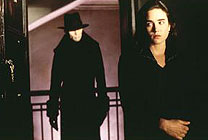|
|
|
|
Dark
City
|
 |
|
Although he is sometimes disparaged as an MTV era director, I am drawn to the films of Australian-born Alex Proyas. His impeccable sense of how to fashion a film as a design object – an integrated arrangement of sets, costumes, special effects and figures in a landscape – meshes with his taste for the modern narrative forms found in today's graphic novels (i.e. comic books for adults). Proyas' previous film The Crow (1994) is the acid test for any filmgoer. Its sweeping vision of a neo-medieval cityscape is contained within the barest and least appetizing of plots – basically, a series of ingenious, gory murders committed by an obsessed, undead anti-hero. In content, The Crow is only one degree away from the trashiest stalker-slasher movie – and yet it works, in part because of this disconcerting, stripped-down storyline. The troubling mixture of highbrow and lowbrow elements again takes hold in Dark City, an extravagant fantasy/sci fi conceit. Each night, as a spooky clan of Strangers engage in a collective dream called the Tuning, the dark city of the title is literally re-fashioned: new architectural structures arise to displace and reshape the existing ones. The citizens of this city are subject to massive mind-control – they are only ever dimly aware that the world around them is changing. Of course, in the tradition of THX 1138 (1971) or Gattaca (1997), it only takes one brave, rebellious individual – in this case, John (Rufus Sewell) – to start unravelling the entire, malevolent conspiracy. Dark City's three writers (Proyas, Lem Dobbs and David Goyer) appear to have each contributed a different layer of references and plot structures. The film is indeed an odd patchwork: memories of '40s film noir, Metropolis (1927), Blade Runner (1982) and Tim Burton's Batman movies collide with an unmistakably erudite reading of Freud's famous Rat Man case-study – not a bad model for paranoid plots. Characters who are little more than types or would-be icons fill this gloomy, urban landscape: Frank (William Hurt), the tersely spoken detective with his generic, stylish hat; Emma (Jennifer Connelly), chanteuse with a heart of gold; Walenski (Colin Friels), a man driven mad by his brush with the terrible truth underlying daily reality. It is not hard to see, with figures like these, why Proyas is often accused of being incapable of spinning old-fashioned tales with characters you can care about. But Proyas belongs to a different and more challenging tradition: like the French team of Jeunet and Caro (The City of Lost Children, 1995) or Walerian Borowczyk (Goto, Isle of Love, 1968), he invites us less into a story than a world, offered up in such a way that we can wander its streets and explore its contours for an entire movie. Proyas is not exactly an avant-garde artist like Orson Welles, using the machinery of big-budget production for his own, experimental ends. Parts of Dark City show him straining towards the same pat resolutions and emotional highpoints achieved by run-of-the-mill movies. In particular, Proyas runs away from the most chilling premise of his story: that the memories, desires and very personalities of the characters are, to some extent, preprogrammed by the mind-warping Strangers. Total Recall (1990) foundered on a similar premise. Dark City vacillates constantly between art movie aspirations and cruder, action-film clichés. To some viewers, this indecision will register as a fatal flaw. To me, it results in a weird, fascinating and highly enjoyable hybrid. In fact, the film is very much like a graphic novel in this respect; it mixes a sometimes adolescent sensibility with flashes of conceptual brilliance. One thing is for certain: Proyas is among those helping to build a bridge towards cinema's future. MORE Proyas: Garage Days, I, Robot © Adrian Martin August 1998 |
![]()